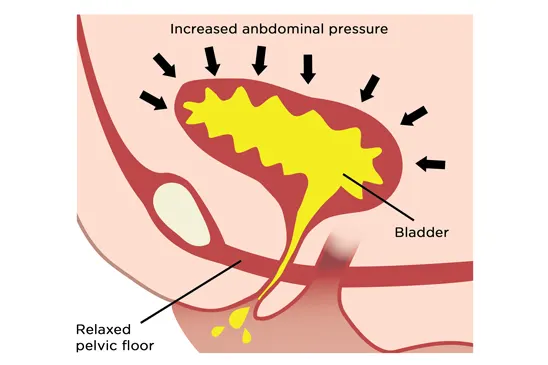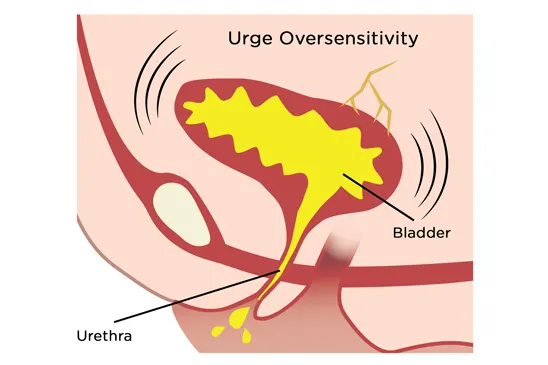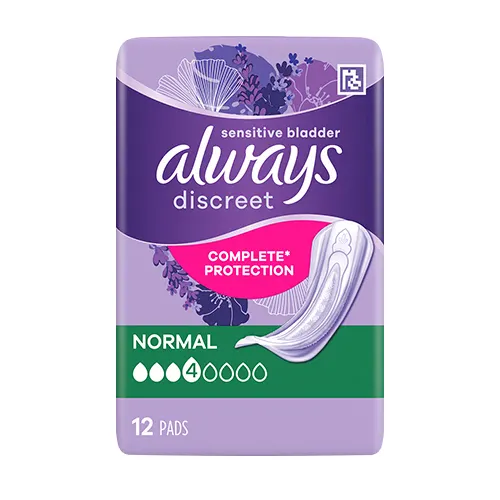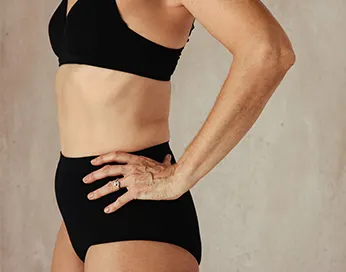
Urinary incontinence is a common condition causing an involuntary leakage of urine from the bladder. There are many possible causes of urinary incontinence in women, such as pregnancy, childbirth, menopause, aging, and certain medications. Because of various symptoms of urinary incontinence, this problem can have a significant impact on the daily life of affected people.
Table of content:
What is incontinence?
So, let’s start with a definition of terms. What is urinary incontinence exactly? To put it simply, it is a reduction in bladder control. It is caused by problems with the muscles and nerves that help the bladder hold or release urine. The symptoms of incontinence can range anywhere from occasional little leaks when you cough, laugh, or sneeze to an urge to urinate that comes on so strongly that you don’t make it to the toilet on time.
Many women experiencing urinary incontinence stop doing certain activities as a result of their bladder leaks. For example, they might be afraid of experiencing bladder leaks whilst out with friends, so they opt to stay home instead of doing much-enjoyed physical activities like aerobics, tennis, dancing, or gardening. Even a short run to the local shop – away from a toilet – can become a source of anxiety. This need not be the case. With a little management, you can live a life filled with the activities you love despite experiencing incontinence.
There is a common misconception around incontinence that it’s an affliction of the elderly. Though it occurs more often as people get older, this condition is experienced also by younger individuals. In fact, 1 in 3 women aged 18 and older experience from urinary incontinence. So, if you experience a leak, you are not alone. Remember that there are many methods and aids that can help you manage incontinence and have an active life.
What are the types of urinary incontinence?
The symptoms of incontinence that you experience depend on what type of incontinence you have. There are several types of urinary incontinence, each with its own set of symptoms and causes. Understanding the differences and similarities between them is important for effective management and treatment. The five main kinds of incontinence are as follows:
Stress incontinence
Stress incontinence is caused by a weakness in the bladder neck, which is the junction between the bladder and the urethra. When your bladder neck is weakened, it is no longer able to hold in little leaks of urine when stressed by things like coughing, sneezing, laughing, or lifting heavy objects. If the condition is more severe, it may also cause leaks during less forceful activities, such as standing up or bending over.
Stress incontinence is more common in women who have had multiple vaginal births, or have gone through menopause. Tissue or nerve damage during delivery of a child can lead to this type of incontinence, and its symptoms may begin soon after the delivery or occur even years later. Some other factors that might contribute to stress incontinence include: illnesses that cause chronic coughing, smoking, obesity, and high-impact activities, such as running.
Such incontinence may be effectively treated by pelvic floor exercises, also known as Kegel exercises, which strengthen the pelvic muscles. Women can perform them on their own or under the guidance of a healthcare provider or physical therapist. Other possible treatments for incontinence are bladder training, medication, or surgery.

Urge incontinence
Urge incontinence, also known as an overactive bladder or OAB, is caused by damage to the nerves in and around the bladder. As a result, the bladder no longer effectively communicates to the brain when it needs to be emptied. This leads to sudden, intense urges to urinate that often don’t leave you with enough time to get to a toilet, resulting in an involuntary loss of urine. The urge to urinate may come on more frequently than it would with a healthy bladder, often leading you to wake up more than once in the middle of the night to urinate.
Urge incontinence may be treated using behavioural therapies, such as bladder training and timed voiding, as well as medication. Bladder training involves gradual increase in the time between bathroom breaks to retrain the bladder to hold urine for longer periods. Timed voiding is based on scheduling visits to the bathroom to prevent the bladder from becoming too full. Surgery may be required in most severe cases of OAB.

Overflow incontinence
Overflow incontinence occurs when your bladder fails to fully empty. The pressure of an overly full bladder results in a constant, involuntary dribble, or flow of urine. Some people may also experience difficulty when starting urination or a feeling of fullness or pressure in the bladder. This type of incontinence is also quite common in men, especially when caused by an enlarged prostate gland.
There are various reasons that might lead to overflow incontinence. One of them is the weakness of bladder muscles, which are unable to squeeze the bladder correctly. This condition can also be affected by nerve damage as a result of injuries, surgeries, or some diseases, making you unable to sense a full bladder. Sometimes overflow incontinence can also be caused by obstructions in the urinary tract, such as bladder stones, constipation, or narrowing of the urethra.

Functional incontinence
Functional incontinence is the result of a physical or mental impairment that prevents you from getting yourself to the toilet in time to empty your bladder. This condition usually involves some physical or environmental barriers. It can be caused by a medical condition like arthritis, which makes it difficult to remove clothes before urinating. Mental deterioration such as dementia could also lead to functional incontinence – the affected person is simply unaware that they need to use the bathroom or is unable to locate it. Finally, one of common causes of this incontinence is some kind of mobility impairment, problems with walking etc.
Mixed incontinence
Mixed incontinence is any combination of two or more of the above types of incontinence. This is a common type of incontinence, especially among women. Symptoms of mixed incontinence may include urine leakage during physical activities such as coughing or sneezing, as well as sudden and intense urges to urinate that cannot be controlled. Those affected by mixed incontinence might also experience frequency, urgency, and nocturia.
One of the most common causes of mixed urinary incontinence in females is pelvic muscles weakened due to pregnancy or childbirth, for example. Other reasons for this incontinence may include nerve damage, hormonal changes associated with menopause, and certain medical conditions like diabetes or Parkinson's disease. Some medications, such as diuretics, may also contribute to mixed incontinence.
Signs and symptoms of urinary incontinence
The symptoms of urinary incontinence range from occasional leaks of urine when coughing or sneezing to an urge to urinate that is so immediate and strong that the affected person is unable to get to a toilet in time. Some common signs and symptoms of urinary incontinence are as follows:
- unintentional urine leaks – as the most obvious symptom, leakage may occur during everyday activities and lead to incontinence when coughing, sneezing, or laughing, or during an intense urge to urinate;
- frequent urination – the need to urinate often is another common symptom of urinary incontinence;
- difficulty with emptying the bladder – some people with urinary incontinence may experience difficulty emptying their bladder completely, which leads to residual urine in the bladder and increased risk of urinary infections;
- strong urge to urinate – this symptom can be triggered by various factors such as running water, cold temperatures, or certain medications;
- painful urination – pain or discomfort during urination can indicate various conditions, including urinary tract infections, bladder stones, or inflammation of the bladder;
- nocturia – incontinence can often make the affected individual wake up at night to urinate, which is disruptive to sleep and may lead to fatigue or daytime drowsiness;
- emotional distress – this symptom can result in anxiety, depression, or social isolation.
Causes and risk factors of urinary incontinence
There are many different causes of urinary incontinence, including underlying medical conditions, lifestyle factors, and certain medications. Understanding them can help individuals and healthcare providers develop effective treatment plans to manage or even cure this condition. Below are some of the main causes and risk factors associated with urinary incontinence.
Some of temporary and short-term causes of incontinence:
- Urinary tract infection – Urinary tract infections irritate and inflame the tissues in the bladder and urinary tract, causing urge incontinence. This kind of incontinence is temporary and will go away when the infection clears up.
- Medications – Some diuretics or antidepressants could lead to incontinence as a temporary side effect.
- Food and beverages – Drinks like coffee and alcohol can significantly increase the need to urinate much more often. The same goes for foods such as chocolate, chili peppers or citrus fruits.
- Constipation – Some problems with bladder control can be caused by chronic constipation because the rectum shares many nerves with the bladder.
The following long-term causes could lead to incontinence:
- Pregnancy and childbirth – The hormonal changes and weight of carrying around a foetus can affect the pelvic floor. Vaginal childbirth can damage the pelvic floor and the surrounding nerves and tissues, leading to chronic stress or urge incontinence.
- Being overweight – Carrying extra pounds puts stress on the pelvic floor, leading to stress incontinence. This can usually be rectified by losing weight.
- Menopause – The lack of oestrogen causes depletion of collagen in the bladder and urethra and weakens the tone overall. This leads to stress incontinence.
- Previous surgery – Having undergone a previous surgery in your lower abdominal cavity, such as a hysterectomy or C-section, may have damaged the nerves leading to the bladder, resulting in urge incontinence.
- Obstruction – Blockages anywhere along the urinary system, such as urinary stones or polyps along the bladder or urethra, can prevent the bladder from fully emptying, leading to overflow incontinence.
- Neurological disorders – Diseases such as multiple sclerosis or Parkinson’s affect the brain’s communication with the nerves in the body, which can lead to urge incontinence.
- Smoking – Chronic smokers' cough can weaken the pelvic floor by exerting continually repeated pressure on the muscles of the pelvic floor that can eventually lead to their weakening.
- Urinary tract infection – Urinary tract infections irritate and inflame the tissues in the bladder and urinary tract, causing urge incontinence. This kind of incontinence is temporary and will go away when the infection clears up.
- Familial history / genetics: it is very common to see weak bladder being passed down from mother to daughter regardless of history, child birth etc…
Remedies and treatments for incontinence
How you treat your incontinence depends largely on what type of incontinence you experience. Treatments can range from lifestyle adjustments in what and when you eat and drink, to surgery. In general, urinary incontinence can be managed and possibly even cured, provided that we use an appropriate treatment plan.
Behavioural and lifestyle changes
First of all, some behavioural and lifestyle changes can help to reduce the symptoms of urinary incontinence:
- bladder training – scheduling regular bathroom breaks and gradually increasing the time between visits to the bathroom;
- dietary changes – Avoiding bladder irritants such as caffeine, alcohol, and spicy foods can help to reduce symptoms;
- weight management – maintaining a healthy weight can help to reduce pressure on the bladder;
- quit smoking – smoking can contribute to weakening of the pelvic floor muscles, increasing the risk of incontinence when coughing;
- pelvic floor muscle exercises – strengthening the muscles that support the bladder can help to reduce leakage.
Bladder control training
Another option is bladder control training, which means learning techniques to strengthen the muscles that control the bladder:
- kegel exercises – they help to strengthen the pelvic floor muscles;
- biofeedback – using sensors to monitor muscle activity and provide feedback to help with muscle training;
- electrical stimulation – using a device to stimulate the pelvic floor muscles and improve their strength.
Medical treatments
If behavioural and lifestyle changes and bladder control training are not effective, there are medical treatments for incontinence that may be recommended. These may include:
- medications – certain drugs can help to relax the bladder or reduce urinary urgency;
- medical devices – urethral inserts or pessaries can help to support the bladder and minimize leakage;
- surgery – in some cases, it may be recommended to repair or replace weakened or damaged pelvic floor muscles or to address other underlying conditions that contribute to urinary incontinence.
Can urinary incontinence be prevented?
Urinary incontinence cannot always be prevented, but there are steps that can be taken to reduce the risk of developing it. These include some good habits for keeping the bladder healthy. While they may not guarantee that you will never experience from urinary incontinence, there are some steps you can take to reduce and prevent bladder leaks, for example:
- strengthen the pelvic floor muscles – pelvic floor exercises can help to strengthen the muscles that support the bladder and prevent leakage;
- stay hydrated – drinking sufficient amount of water can help to keep the bladder healthy and reduce the risk of infections;
- avoid bladder irritants – certain foods and drinks, such as caffeine, alcohol, and spicy foods, can irritate the bladder and increase the risk of urinary incontinence;
- maintain a healthy weight – obesity can put pressure on the bladder and increase the probability of urinary incontinence;
- consume enough fibre – hard hard stool stuck in your rectum can block urine from coming out of the bladder, so remember to eat plenty of fibre every day for good and regular bowel movement.
Always Discreet is a line of thin and absorbent liners, pads, and pants that allow you to discreetly go about your day without giving a second thought to your bladder leaks. Always Discreet have an absorbent core that turns liquid into gel – locking in bladder leaks and odours in seconds. This technology also keeps Always Discreet products thin, making them comfortable to wear. This also means they’re discreet under your clothes Pick out the right Always Discreet range to explore which products can help you to protect against bladder leaks and live your life to the fullest, without compromise.




